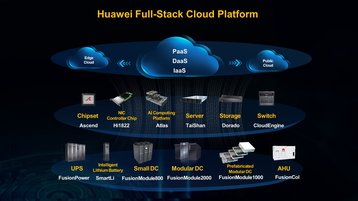As organizations around the world turn to digital transformation and innovation to pull ahead of the competition, many are upgrading and modernizing their existing IT infrastructure to deliver the new, fluid capabilities needed to support today’s hypercompetitive business environments.
This invariably includes a reevaluation of existing data centers, the specialized facilities built to support the smooth functioning of IT systems.
To drive digital transformation, a data center overhaul or revamp is often necessary to support power-hungry private cloud and hybrid cloud deployments.
The full-stack data center
Known for its telecommunications equipment used by 45 of the top 50 carriers globally, Huawei has invested substantial research and development (R&D) into communication technology (CT) and information technology (IT) systems over the last 30 years.
By combining its extensive ICT experience with deep data center know-how, Huawei has developed a complete range of solutions from facility-level hardware for data centers to the IT equipment needed to support complex cloud systems.
This starts with modular data centers systems for rapid deployment, to data center
components such as UPSs, PDUs, cooling systems, and the DCIM software used to manage and operate them. A comprehensive suite of servers, storage and networking infrastructure is also available, as well as converged and hyperconverged platforms for scale-out deployments for a full-stack solution.
Huawei full-stack cloud platform
These are not hypothetical systems that have never been tested together. Built using prefabricated modules, Huawei’s own cloud data centers at Dongguan and Ulanqab in China are fully functional data centers built using Huawei’s full-stack data center solution, among deployments at other locations.
Crucially, Huawei is also a heavy contributor to the open-source OpenStack platform and has its own commercial FusionSphere distribution with enterprise-level enhancements for improved management and reliability. Platform-as-a-Service (PaaS) capabilities also deliver a range of data enablement tools to support database and data warehousing implementations, while Software-as-a-Service (SaaS) offerings offer advanced big data and AI services such as visual and speech recognition.
Maintaining cohesiveness and integration across such a broad range of systems is a continuous effort, especially considering the sheer breadth and depth of the company’s offerings. To address this, Huawei has built OpenLabs for the enterprise market in Suzhou, Munich, Paris, Mexico City, Singapore, Dubai, Bangkok, Delhi, Cairo, Johannesburg, Moscow, and Istanbul. We are developing the best industrial solutions with customers and partners in different domains around the world.
Understanding the rise of AI
With a good understanding of the application and trends of IT infrastructure and cloud service, Huawei has also incorporated advanced artificial intelligence (AI) capabilities into its range of data center facility offerings to further enhance the capabilities of its solutions.
Research from the McKinsey Global Institute says that AI has the potential to add about US$13 trillion to total economic output by 2030 and boost global GDP by about 1.2% per year. About 70% of global companies are expected to adopt at least one AI technology in the next decade, and more than 50% of global companies will adopt all AI technologies.
The rapid and widespread adoption of AI is staggering, and there is no question that it will become the core driving force behind the fourth industrial revolution.
Already, AI is spurring profound and potentially disruptive changes in the world, in diverse fields such as autonomous vehicles, smart digital assistants, home automation and digital marketing.

